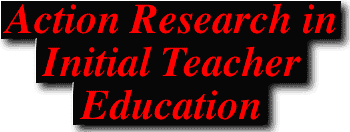 |
||||||||||||||||||||||||||||||||||||||||||||||||||||||||||||||||||||||||||||||||||||||||||||||||||||||||||||||||||||||||||||||||||||||||||||||||||||||||||||||||||
In 1992/93 Moira Laidlaw produced the action research guide for novice teachers below.

INTRODUCTION
Teachers have an enormous fund of knowledge about their own practice, their children and their classrooms. Much of the time though, they are told by external forces what constitutes meaning in their own unique environments. Action Research empowers classroom teachers to construct their own knowledge and to make it available to others for their benefit and the benefit of their pupils.
This Guide aims to give practical advice to student teachers who wish to embark on an Action Research enquiry. It will be divided into four sections; the first will comprise a guide to those aspects which need to be borne in mind throughout the enquiry; the second will deal with individual aspects of the research; the third will look at a quality which always emerges with Action Research, that of collaboration; and the fourth will constitute some reflections by a P.G.C.E. student, Jonathan Jones (1990/91) about the process of working with Action Research. In addition this section will include some conclusions from the Final Reports of four students (1991-92) Throughout the Guide I will be using case-study material from Justine Hocking (1991/92), two of last year’s P.G.C.E. students, Jayne Prior (1990/91) and Jonathan, of the enquiries that they conducted on first Teaching Practice, and from an Undergraduate Biological Sciences student, Zac Watkins (1990/91) and the work he did on Second Teaching Practice. The whole Guide will take you through the various stages and try to answer the questions that have occurred most often in my experience of advising on Action Research.
So there will be explanatory notes first on the fusion between the two terms ‘Action’ and ‘Research’, the Criteria for Success, and also the importance of exercising your professional judgement about confidentiality, and in addition a section about the significance of Validation Groups. The Guide will look at the framework of an enquiry and then offer sections on the significant aspects. These will include finding the question, the role of a ‘critical friend’ and that of the observer, and then subsequent ones on the use of talk, writing, and the notion of ‘making public’ which must be borne in mind during any enquiry, some words on collaboration and then Jayne’s and Jonathan’s reflections. This is followed by a section on the validity of an Action Research Enquiry and how it must relate to pupil-learning.
The files are stored in Rich Text Format, the page numbers
and footnotes may change on your computer.